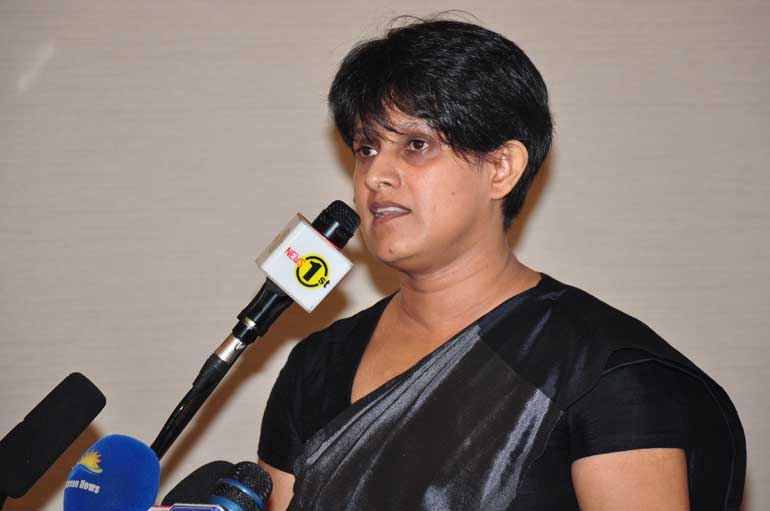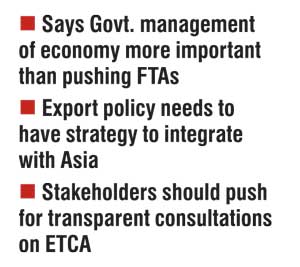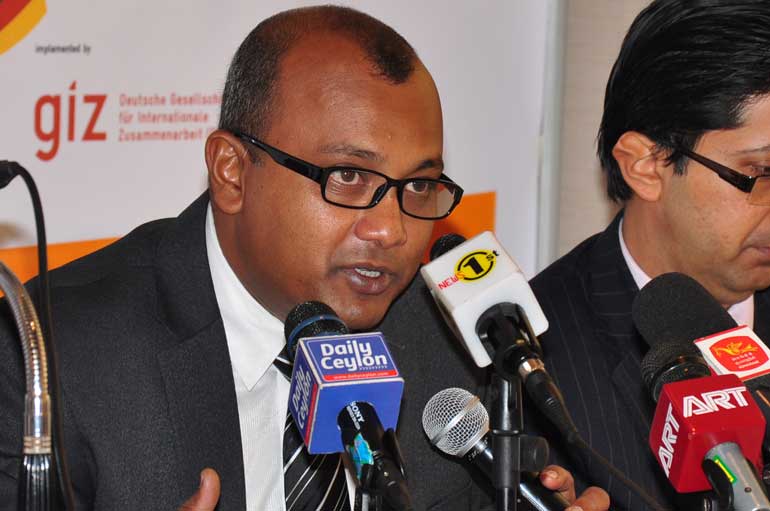Sunday Feb 22, 2026
Sunday Feb 22, 2026
Saturday, 12 March 2016 00:00 - - {{hitsCtrl.values.hits}}

Verite Research Economist Subhashini Abeysinghe – Pic by Lasantha Kumara
By Charumini de Silva
 Sri Lanka’s traditional exports must also feature prominently in trade expansion deals for the country to competently leverage its advantages in future agreements, a top researcher said yesterday.
Sri Lanka’s traditional exports must also feature prominently in trade expansion deals for the country to competently leverage its advantages in future agreements, a top researcher said yesterday.
The Government should consider including competitive sectors of the economy such as apparel and tea as the usefulness of a trade agreement largely depends on competitive export products as well as its market liberalisation, argued Verite Research Economist Subhashini Abeysinghe at the SAARC Entrepreneurs Forum organised by FCCISL yesterday.
Sri Lanka has a serious problem in creating capacity and competitiveness in export markets, she noted, insisting that despite the country shifting from being low income to a middle income country and from a labour surplus economy to a labour shortage economy with an ageing population, it had failed to transform the economic structure and its sectors.
She pointed out that all three trade agreements Sri Lanka had signed in South Asia had failed to give meaningful market access to potential exports to drive the growth in the country’s economy.
While the whole world is focusing on improving their relationship with Asia because it is considered as the Asian century, Sri Lanka unfortunately is missing its focus on this potential market, she said.
“To this end we really need to have a policy to integrate with Asia. That should be one of the key points in our export policy. Right now beyond trade agreements, we do not see any other instruments in our policies that the Government is trying to pursue. But if they think that trade agreements are the only way forward, I do not think they will achieve the expected results,” Abeysinghe opined.
Noting that sound macroeconomic policies were critical to have a sound business environment, she affirmed that trade agreements would only be beneficial if the economy was managed well by the Government with a holistic approach towards development.
Voicing caution on the proposed Economic and Technology Cooperation Agreement (ETCA), Abeysinghe refrained from commenting as no one as yet has a clear idea about the contents of the framework.
“It is very difficult to see what the final shape of this animal would be because it will go through substantial changes. The best thing stakeholders can do is be involved in the process constructively and enlighten the Government that they need proactive consultants and be transparent about these negotiations,” she noted.
Pointing out it takes many rounds of consultation and years for countries to conclude an agreement, she said it was very difficult to comment on an agreement no one had seen.
Citing an example, she asserted that certain agreements made by India had taken over 70 rounds of consultation with some still under negotiation even after five years like the EU-India FTA, which also involves services.

Following global trends, the Maldivian Government is considering removing red tape and non-tariff barriers to encourage trade and investment with open policies particularly to enhance SAARC trade relations, the Maldivian Deputy High Commissioner Abbas Adil Riza said yesterday.
Affirming that harmonised non-tariff barriers are important to increase trade and investment and will have positive impacts on all South Asian Association for Regional Cooperation (SAARC) countries, he invited Sri Lankan companies to explore the opportunities available in the Maldives.
Speaking at the SAARC Entrepreneurs Forum organised by the FCCISL, he said the Maldives was going through an infrastructure development period and pointed out there was huge potential for Sri Lankan construction companies in the areas of road and resort development.
Noting Sri Lanka’s leading construction company Access Engineering had received a subcontract worth $ 350 million to build a China-funded bridge connecting the international airport island with the Maldives capital, Riza added that such ventures would open up many more subcontracting opportunities for Sri Lankan construction companies in the Maldivian market.
He also said that the Government had decided to provide 100% tax exemption for tourism development in the Maldives and already a few Sri Lankan companies had shown interest to explore them as joint ventures.
When asked if there were any interested companies from Maldives to venture into tourism in Sri Lanka, he said he could not divulge at this stage but the experience of the only hotel project they did here was not positive.